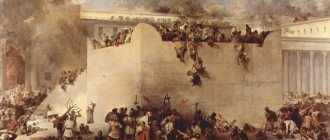Text of prayer Psalm 40
In Church Slavonic with accents
1 Finally, a psalm to David 2 Blessed is he who is poor and wretched; on the day of cruelty the Lord will deliver him. 3 May the Lord preserve him and live him, and make him blessed on earth, and may he not deliver him into the hands of his enemies. 4 May the Lord help him in his sickness: you have turned all his lies into his sickness. 5 Az said: Lord, have mercy on me, heal my soul, for I have sinned. 6 My enemies have decided evil against me: when will his name die and be destroyed? 7 And when he came in, he saw his heart babbling in vain, storing up iniquity for himself, and he went out and babble together. 8 Against me all mine whispers, against me they think evil. 9 You have laid the word of transgression upon me: food and sleep will not cause you to rise again? 10 For the man of my world, in whom I trusted, eater of my bread, bring stumbling upon me. 11 But you, Lord, have mercy on me and raise me up and repay them. 12 In this knowledge, because you have desired me, because my enemy will not rejoice over me. 13 But for my kindness you accepted me and established me before You forever. 14 Blessed is the Lord God of Israel from everlasting to everlasting: be, be.
In Russian
1 For execution. Psalm of David. 2 Blessed is he who thinks about the poor [and needy]! On the day of trouble the Lord will deliver him. 3 The Lord will protect him and spare his life; blessed will he be on earth. And You will not give him up to the will of his enemies. 4 The Lord will strengthen him on his sickbed. You will change his whole bed in his illness. 5 I said: Lord! have mercy on me, heal my soul, for I have sinned before You. 6 My enemies say evil things about me: “When will he die and his name be destroyed?” 7 And if anyone comes to see me, he speaks a lie; his heart contains untruth, and he goes out and interprets. 8 All those who hate me whisper among themselves against me, plotting evil against me: 9 “The word of Belial came upon him; he fell ill; he will not rise again.” 10 Even the man who was at peace with me, in whom I trusted, who ate my bread, lifted up his heel against me. 11 But you, O Lord, have mercy on me and raise me up, and I will repay them. 12 From this I know that You will be pleased with me, if my enemy does not triumph over me, 13 but You will keep me safe and set me before Your face forever. 14 Blessed be the Lord God of Israel from everlasting to everlasting! Amen, amen!
What is Psalm 40 about?
It is sometimes said that this hymn is of later origin and could have belonged to the pious Jewish king Hezekiah. According to 2 Kings, he “fell sick to death.” When the prophet came to the king. Isaiah , with the words of the will of God that the king must prepare for his death, Hezekiah “turned his face to the wall.” With great tears he offered a prayer:
"Oh my God! Remember that I walked before You faithfully and with a heart devoted to You, and did what was right in Your sight.”
(2 Kings 20:1-3).
This prayer could have been Psalm 40, which the king may have later written down. However, most biblical scholars still believe that the author of the hymn is King David, and the reason for its appearance is persecution from his son Absalom, who wanted to take the royal throne. Forced to flee for his life, the king pours out his sadness and hope with words of prayer.
David the psalmist, king and prophet by Vladimir Borovikovsky, 1785 Oil on canvas. 63.5 × 49.5 cm. State Russian Museum, St. Petersburg
History of the song
As you know, King David had many children. And one of them was the stately and handsome young man Absalom. Despite the fact that he killed his brother and constantly quarreled with his father, he laid claim to the royal throne.
If we recall ancient history, the murder of a brother was entirely due to the rape of his sister. It was for this act that Absalom committed fratricide. Later he hid from his father for a long time. But in the end he was forgiven by the king. Despite David's mercy, the young man convinced people that under his rule life would improve and would be much happier and better. He persuaded everyone right at the royal gates. These efforts were not in vain and soon many rebelled against King David. This led to him fleeing home with his family and hiding from the rebels and his own son.
All the hope and all the feelings of King David during this period of his life are expressed in the prayer text he wrote, Psalm 40. It is worth noting that the song does not contain violent requests for deliverance from enemies. There is only hope here that the situation will change for the better.
Where did Psalm 40 come from?
This is the prayer of King David, who is trying to express his hope to God so that He will save him from death. In his sacred text, David resorts to the fact that the soul is capable of healing, and relief and freedom are an important moment after reading Psalm 40. David asks the Lord God to give him as much strength as possible, only in this way will the king be able to cope with all enemies who have always been against him.
This is by no means a condemnation of enemies, it is an opportunity to show all ill-wishers that a good person who sincerely believes in God is much stronger than all enemies combined. By the way, you can read this text both in the church in front of the main icon and at home. The most important thing is to believe in the Almighty and not doubt one bit about his powerful and great power.
Rules for reading and why do they read Psalm 40?
The prayer text was not created in simple times, when David experienced betrayal and torment. Why do they read Psalm 40? It is necessary for those who have also encountered troubles, difficulties, and betrayal along their life path. The song is read during:
- Sorrow;
- Betrayal;
- Life's difficulties and trials;
- Mental experiences.
The text gives hope, gives faith in the Lord, returns spiritual strength. Sometimes you don’t see a way out of the current situation, and only a conversation with the Lord can help you get ready.
Orthodox Christians read Psalm 40 in Russian in order to more accurately understand the text of forgiveness and gratitude, in order to be closer to God, to feel his support and presence.
What is a psalm?
This chant, so named because from ancient times, as a rule, was accompanied by playing the psalter. In total, the book consists of 150 psalms, in addition, in Russia and Greece it is customary to include one more, which the Jews have, but there is one in the translation of the book into Greek.
Psalter, Psalter (Church Glav. Ѱaltir, lat. Psalterium[1]; from Greek ψαλτήριον, after the name of the musical instrument psaltery; in Judaism - Tehillim[2], Hebrew תהלים[3] - lit. “praise”[4]) - the book of Tanakh and the Old Testament
Now the book consists of 20 parts, called by the Greek word “kathisma”. Since ancient times, according to St. Gregory of Nyssa, it was divided “into five parts, in the likeness of the Pentateuch of Moses.” The hymn that concluded each of them ended with the words “Amen, Amen.” Based on this feature, one can see the ancient division of the book even now. Psalm 40 was precisely the conclusion of the first of the five parts of the book.
Interpretations of Psalm 40
To understand well what the text is written about, you need to read it at least several times, completely percolating it through your soul. Psalm 40 in Russian can be interpreted as follows:
- Verses 1 to 4. The story of the king himself about the betrayal of his son, about escaping from his home, about wanderings and exile. All his friends gradually turned away from King David, so he feels lonely, lost in this world. He says that it is compassion that can save this very world.
- Verse 5. Confessing one's own sins. David repents of many of his actions and asks for forgiveness from the Lord and those around him.
- Verse 6 to 10. The lyrics describe all the suffering that befell the king. Even his illness is considered by the people as a punishment from God. David's friend is described as Judas, who was also a traitor.
- Verses 11 to 13. They say that it was this situation with the betrayal of his son and friends that showed David his closeness to God. The king asks for mercy and forgiveness.
- Verse 14. After all the litigation, difficulties and illnesses, we need to be grateful. This is the end of the king's first praises.
( 2 ratings, average: 5.00 out of 5)
Briefly about the Psalter
This is one of the books of the Old Testament, the name of which comes from a string instrument, the psalter - after all, the texts created by King David (the author of most of the songs) were not intended for reading, but for singing, which was accompanied by music.
In ancient times, they were performed during worship, first in the tabernacle - the camp tent of the Jews, where the Ark of the Covenant was located - then in the temple, built by David’s son, Solomon . It is from here that explanations to texts like: “song of ascent” (this means that hymns are sung upon entering the temple), “to the end” (the psalm prophesies about the distant future), “to the chief of the choir” (meaning, of course, singers accompanying the temple service), others.
How to read the Psalter correctly
The statutory requirements for such reading apply only to church services . Among these are instructions on the reading of certain kathismas during a particular service. In addition, the so-called “line principle” is applied, when the text is read smoothly, unemotionally, one might say, monotonously. This helps the reader and listener to focus on its content, while at the same time getting away from the mass of emotions and experiences that surround a person in the world.
According to the words of the holy fathers, “the cell shall not have a charter,” that is, at home the believer reads according to his strength and capabilities. Typically, the beginning of the reading is preceded by ancient prayers dating back to the first centuries of the Church, known as the “ordinary beginning.” These are prayers to St. Trinity, "Our Father". You can also read special prayers - they are located at the beginning of the Psalter itself. Then a kathisma is read, or several, at the request of the worshiper. Modern pastors recommend that beginners start with even 1-2 hymns, but read slowly and carefully.
After all, according to Rev. Oleg Stenyaev in an interview dated February 7, 2022, “Reading the Psalter is a special state of spirit: when a person is immersed in these verbs, he seems to acquire angelic grace. We know that angels constantly stand before the Throne of God and sing His wonderful Names. And every time an Orthodox Christian, adult or child opens the Psalter and begins to pray through it, they join the angelic choir. And while living on earth, they seem to find themselves in heaven.”
The reading also ends with special prayers that complete the Psalter.
“We are oppressed on every side, but not constrained; We are in desperate circumstances, but we do not despair” (2 Cor. 4:8).
This is what the Apostle Paul said about the difficult circumstances of life.
King David also calls to turn to the Lord, to hope, to ask for healing not only of the body but of the soul.
Natalia Sazonova
Peculiarities
The hymn ends part 1 of the Psalter, which, according to many interpreters:
- is the most ancient, that is, it contains hymns written personally by King David, while other parts also contain hymns by other hymns;
- describes the plight of the Davidic kingdom - most of the psalms really talk about suffering, disorder, and attacks from enemies.
At the same time, the 40th is like a culmination, because it talks about betrayal, about how his own son rebelled against the king.
Interpretation
Like all David's hymns, the 40th also has meanings hidden behind its literal, historical content. For example, one of the themes of the anthem is betrayal. David says that even the “man of peace” in whom he trusted “lifted up his heel” against the king. Here, of course, Absalom is meant - but not only him. For a Christian, there is a clear association with the betrayal of Christ by Judas, the closest Apostle . Wasn’t he as close to the Savior as his own son was to David? Did not Christ rely on him?
When Psalm 40 is read. Key situations
In relation to Psalm 40, we can identify key situations in which reading or listening to an audio version of the psalm will serve as a source of inspiration, support for resolving difficult circumstances:






